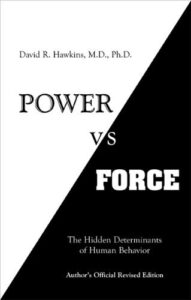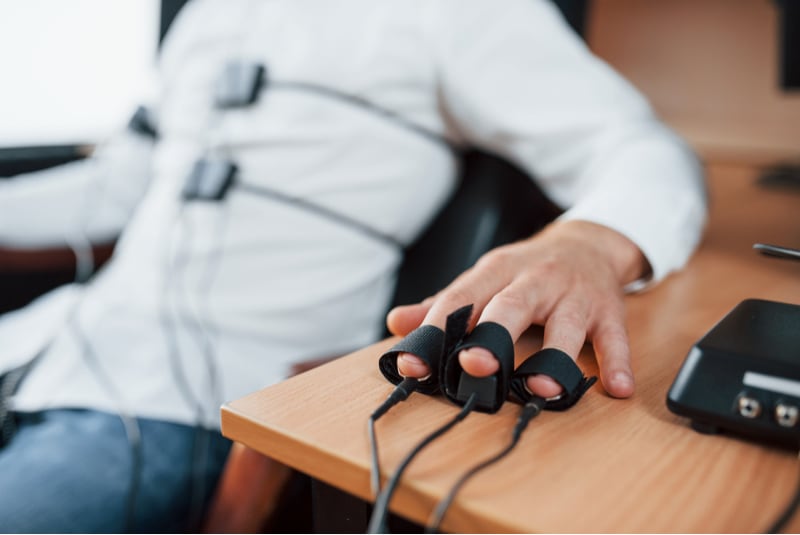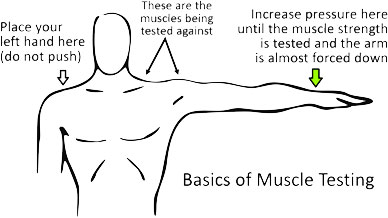What is Muscle-Testing?
Originally developed as a tool for chiropractors, muscle testing (also known as applied kinesiology) assesses the body’s response to stimuli to uncover truths that may not be readily apparent. Chiropractors use muscle testing to diagnose alignment issues or nutritional needs by gauging the body’s strength or weakness in response to different tests. Over time, this method became recognized for its practical applications in health and its versatility in decision-making, due largely to Dr. David Hawkins, who popularized it with his book Power vs. Force.
Dr. David Hawkins and Muscle-Testing
In Power vs. Force, Dr. Hawkins presented muscle testing as a tool for discerning truth from falsehood. He argued that the body’s responses could reveal answers to questions beyond health, making it a powerful tool for decision-making in daily life. He proposed that anyone could use muscle testing to determine the best course of action in areas like nutrition, relationships, business, investments, and more.
The simplicity of muscle testing is part of its appeal: the body “knows” and reacts to what aligns with it. By testing a muscle’s response to a question or item, one can discern a “yes” or “no” answer based on whether the muscle remains strong or weak. Dr. Hawkins’ theory was that our bodies have innate knowledge that can reveal truths often hidden from our conscious mind.
Practical Applications in Law Enforcement and Daily Life
Since muscle testing doesn’t rely on psychic ability, anyone can learn it, and it has begun to find its way into investigative practices. Investigators may use muscle-testing to gain clarity on challenging cases, evaluate suspect credibility, and even gather new leads. This method doesn’t replace traditional investigative techniques but rather serves as an additional tool that can guide where to focus efforts.
In law enforcement, detecting the truth from deception is often challenging, as suspects can vary in their reactions and demeanor. Traditional methods like polygraph tests measure physiological responses, such as heart rate and perspiration, to assess honesty. However, they are not foolproof. An innocent person might be overly anxious, leading to false positives, while those with psychopathic traits may bypass the physiological markers, resulting in false negatives. Due to such limitations, law enforcement has turned to various alternative tools, some unconventional yet effective, to dig deeper into cases.
Interestingly, law enforcement has also been known to consult psychics for cold cases or investigations at a standstill. Although it may sound unconventional, there are documented cases where insights from psychics have brought new leads to previously stalled investigations. But while psychic abilities are innate and cannot be easily taught, a method that is gaining popularity among detectives and investigators is muscle testing, a practical and learnable skill that anyone can use to extract valuable insights.
But the use of muscle-testing isn’t limited to law enforcement. Parents, for example, find it beneficial in understanding and supporting their children, particularly those with special needs or behavioral challenges. They might use it to help determine the source of emotional distress or identify safe foods and environments.
Similarly, people in the dating world are turning to muscle testing to assess potential long-term partners, particularly in cases where red flags may not be immediately apparent. For example, Dr. Pete Eaton, a proponent of muscle testing in relationships, suggests that it can help determine compatibility in areas such as emotional needs, values, and even sexual compatibility. By checking a potential mate’s “level of sexual hunger” through muscle testing, individuals can gain a sense of whether their partner’s needs align with their own.
Using Muscle-Testing to Identify Manipulation
As muscle testing grows in popularity, its uses are expanding into all areas of life. At work, people might use it to gauge the trustworthiness of a colleague or the validity of a business opportunity. Students can use it to make decisions around peer influences, helping them stay focused and grounded.
Muscle testing has even found application as a fraud detection tool. If someone suspects they are being deceived or scammed, muscle testing may provide an intuitive check on the person or offer being presented. For those facing marital trust issues, muscle testing could serve as an accessible alternative to hiring a private investigator, offering clarity without the need for invasive measures.
Learning Muscle Testing
Learning muscle testing is a straightforward process that begins with a simple muscle strength test. Here’s a basic way to try it with a partner:
- Find a partner who will gently press down on your outstretched arm while you resist.
- Ask a simple question that you know the answer to (such as “Is my name [your name]?”).
- Note the response: If your arm remains strong, the answer is “yes”; if it weakens, the answer is “no.”
While this is a basic introduction, there are nuances to muscle testing that improve accuracy and reliability. Training workshops, books, and online resources provide guidance for those interested in mastering the technique.
Muscle-Testing as an Expansive Tool
The beauty of muscle testing lies in its adaptability. It offers a way to access insights into significant decisions and day-to-day interactions, whether for investigative work, personal relationships, or wellness choices. For many, it’s a reassuring method that bypasses the need for guesswork, allowing for confident, clear, and authentic choices.
As muscle testing gains wider acceptance, its potential applications are likely to grow. In a world where truth can often be elusive, this powerful technique offers a grounded approach to uncovering it—no psychic powers required. Whether in the hands of a seasoned investigator or a curious parent, muscle testing is shaping up to be a valuable tool for navigating a complex world with clarity and integrity.






